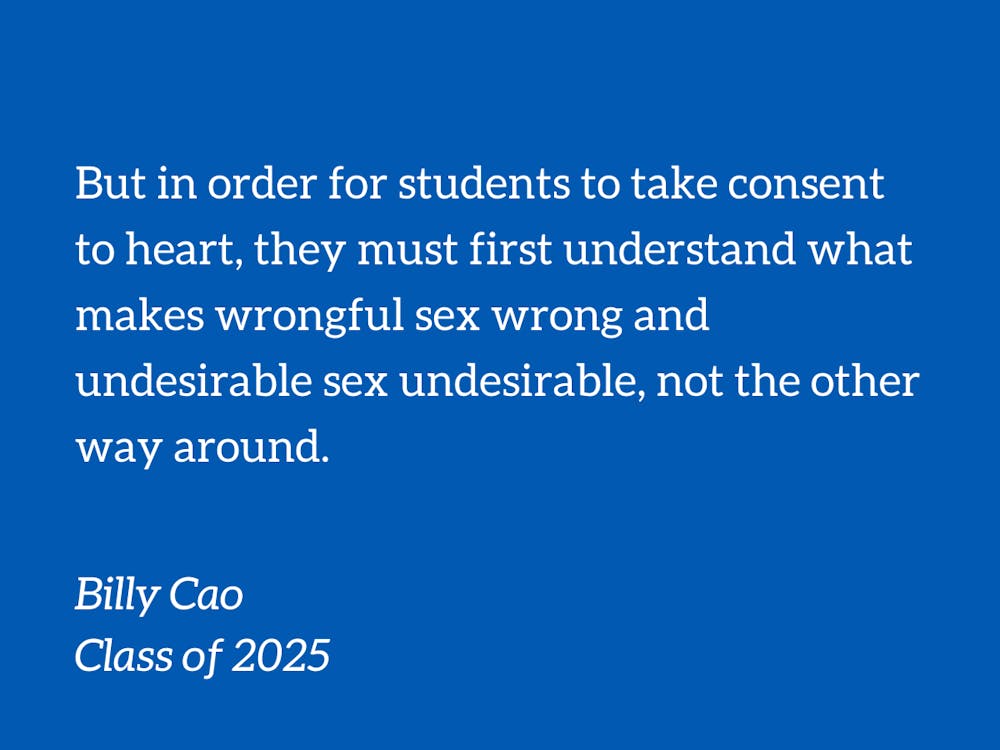Let’s face it: consent won’t end the culture of sexual harassment at Duke. We can sexualize consent all we want, yet the fact remains that giving and asking for permission with sexual progression is overwhelmingly shaped by gender expectations, alcohol consumption, and the pressure to engage in casual sex. Not to mention how years of campaigning for the importance of consent has failed to resolve the epidemic of sexual assault on campus.
Legally, affirmative consent reflects the willingness to have sex, but does not necessarily mean that sex is desired. Imagine that you agree to hook up despite deep ambivalence and end up feeling disgusted and ashamed the next day. Or that you choose to have sex with your partner in order to keep them happy. Or that you decide to work in pornography to pay for the exorbitant Duke tuition. Sex is unwanted in these cases but nevertheless passes the admittedly low benchmark of consent.
Many feminist thinkers have attempted to raise the bar of consent through the Yes Means Yes slogan. They think consent is only given when it is given enthusiastically, unequivocally, and without hesitation. They also believe that more women should speak up about their sexual desires (indeed, they frame it as a duty) and that men should be more attentive to what their female partners want and why.
However, more than a decade after the publication of Yes Means Yes, the disparity in sexual pleasure is still alive and well. We must therefore resist thinking of consent, and for that matter enthusiastic consent, as the criterion for desirable sex and the locus for the transformation of our sexual culture. For starters, even enthusiastic consent does not guarantee creative, fulfilling and pleasurable sex – it can nevertheless be dull and immiserating. As Joseph Fischel points out eloquently in Screw Consent, “we can haphazardly or ambivalently consent to sex that is fantastic, and consent fantastically to sex that is resolutely unfun.”
Enthusiastic consent also puts women in a bind, as Katherine Angel shrewdly observes. Women are told that they must be able to articulate their sexual desire even though it is often opaque, responsive in nature and slow to emerge. They are urged to use their self-expression as armor when they are already in a vulnerable position in dynamics of unequal power. They are admonished to become confident, assertive, and sex-positive when the expression of their sexuality on one occasion can and often will be used against them if they are assaulted or raped in the future. Suffice to say, women are punished in one way or another no matter how they act.
The fundamental issue is that the emphasis on consent fails to elucidate how the conceptualization of consent, too, is shaped by cultural norms and structural factors. The consent discourse casts men as incapable of controlling their sex drive and makes it an imperative for women to express their sexuality, which are themselves myths about sex that do considerable disservice to the marginalized. Amia Srinivasan makes a similar point when she asks, “how do we formulate a regulation that prohibits the sort of sex that is produced by patriarchy?” There’s good reason to believe that we don’t: regulations such as the Duke sexual misconduct policy are not adequate solutions, and consent is too crude a tool.
Let us follow Fischel, Angel, Srinivasan, and many others’ lead, then, in relegating consent to the legal realm and revise our discourse to ensure a safer and better sexual culture.
At the university level, this necessitates the establishment of sexual advising programs that, above all else, focus on improving the ability to make sexuality-related decisions, to recognize sexual preferences, and to interrogate cultural norms that stifle erotic pleasure.
Student-led advocacy groups should divert attention from consent to the values and beliefs that perpetuate undesirable and nonconsensual sex in the first place. Why do men pressure their female sexual partners into giving oral sex? Why are women expected to know their sexual desires to defend themselves from rape and assault? What about racialized sexual stereotypes? Answers to these questions are urgently needed but are all too often overshadowed by the technical dispute surrounding consent.
We also need a sexual ethics that transcend consent. It must deny that the often-rigid procurement of consent is sufficient for a desirable sexual culture and restore sex as a creative, pleasurable and mutually beneficial endeavor that is accessible to all. Fischel and O’Connell’s proposal of sexual autonomy, or the capability to co-determine sexual relations, fits the bill. Here, co-determination needs not require an enthusiastic “yes.” Nor does it require equal abilities, sexual experiences, strength, and the like. Instead, it demands genuine attentiveness to structural norms that impede sexual satisfaction, creativity, and the respect for others’ aims and goals, especially in sexual relations of unequal power.
You might protest that I am setting a high ethical standard that is impossible to uphold amidst the rampant assault culture. After all, if people don’t even care enough about consent, how naïve am I to expect that they consider the wellbeing and desire of their sexual partners?
But in order for students to take consent to heart, they must first understand what makes wrongful sex wrong and undesirable sex undesirable, not the other way around. It takes awareness and accountability on our part to foster the capability to codetermine sexual relations – it will not be easy – but we must dare to be a little utopian, aspire to transcend the current sexual standard and become facilitators of a better hedonic culture.
Billy Cao is a second-year at Trinity. His columns run on alternate Fridays.
Get The Chronicle straight to your inbox
Sign up for our weekly newsletter. Cancel at any time.

